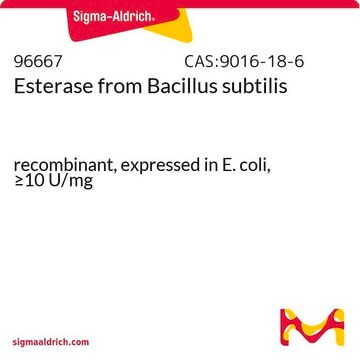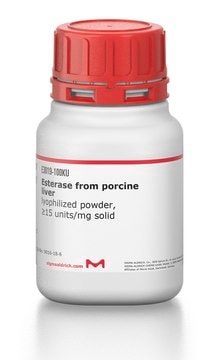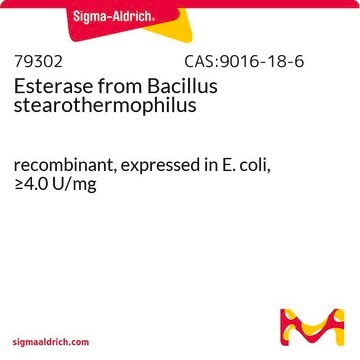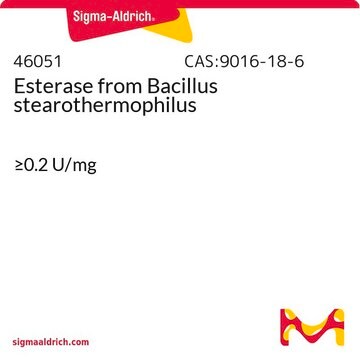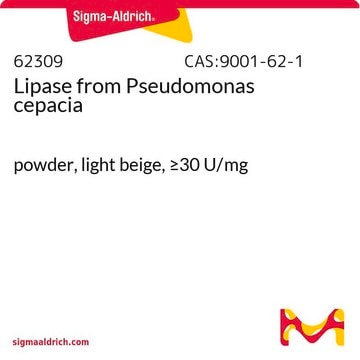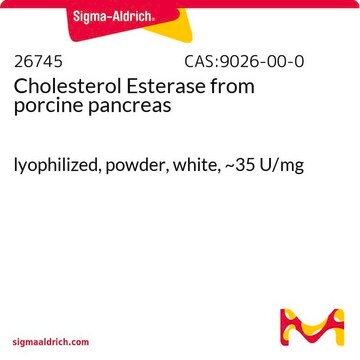75742
Esterase Pseudomonas fluorescens, recombinant from E. coli
≥4 U/mg
Synonym(s):
Carboxylic ester hydrolase
Sign Into View Organizational & Contract Pricing
All Photos(1)
About This Item
Recommended Products
recombinant
expressed in E. coli
form
powder
specific activity
≥4 U/mg
storage temp.
2-8°C
Looking for similar products? Visit Product Comparison Guide
Application
The compound is commonly used for the synthesis of biodiesel and biopolymers, as well as in the production of pharmaceuticals, agrochemicals and flavor compounds.
Biochem/physiol Actions
Esterase acts on water-soluble carboxyl esters containing short chain fatty acids.
Packaging
Bottomless glass bottle. Contents are inside inserted fused cone.
Unit Definition
1 U corresponds to the amount of enzyme which liberates 1 μmol acetic acid from p-nitrophenylacetate per minute at pH 7.5 and 25°C
Signal Word
Danger
Hazard Statements
Precautionary Statements
Hazard Classifications
Resp. Sens. 1
Storage Class Code
11 - Combustible Solids
WGK
WGK 1
Flash Point(F)
Not applicable
Flash Point(C)
Not applicable
Personal Protective Equipment
dust mask type N95 (US), Eyeshields, Gloves
Certificates of Analysis (COA)
Search for Certificates of Analysis (COA) by entering the products Lot/Batch Number. Lot and Batch Numbers can be found on a product’s label following the words ‘Lot’ or ‘Batch’.
Already Own This Product?
Find documentation for the products that you have recently purchased in the Document Library.
Customers Also Viewed
B Sànchez-Nogué et al.
Environmental science and pollution research international, 20(5), 3480-3488 (2012-12-06)
The common sole, Solea solea (Linneus, 1758), and the Senegalese sole, Solea senegalensis (Kaup, 1858), are two important commercial species that coexist in the NW Mediterranean. In order to assess the species' ability to respond to chemical insults, a comparison
Marie C Fortin et al.
Drug metabolism and disposition: the biological fate of chemicals, 41(2), 326-331 (2012-12-12)
Studies on therapeutic drug disposition in humans have shown significant alterations as the result of pregnancy. However, it is not known whether pesticide metabolic capacity changes throughout pregnancy, which could affect exposure of the developing brain. We sought to determine
Judit Marsillach et al.
Toxicology, 307, 46-54 (2012-12-25)
Exposure to organophosphorus (OP) compounds can lead to serious neurological damage or death. Following bioactivation by the liver cytochromes P450, the OP metabolites produced are potent inhibitors of serine active-site enzymes including esterases, proteases and lipases. OPs may form adducts
Joshua P Lewis et al.
Pharmacogenetics and genomics, 23(1), 1-8 (2012-11-01)
Carboxylesterase 1 (CES1) is the primary enzyme responsible for converting clopidogrel into biologically inactive carboxylic acid metabolites. We genotyped a functional variant in CES1, G143E, in participants of the Pharmacogenomics of Anti-Platelet Intervention (PAPI) study (n=566) and in 350 patients
Sascha Obrowsky et al.
Journal of lipid research, 54(2), 425-435 (2012-12-12)
Adipose triglyceride lipase (ATGL) is the rate-limiting enzyme mediating triglyceride (TG) hydrolysis. The lack of ATGL results in TG accumulation in multiple tissues, underscoring the critical role of ATGL in maintaining lipid homeostasis. Recent evidence suggests that ATGL affects TG
Our team of scientists has experience in all areas of research including Life Science, Material Science, Chemical Synthesis, Chromatography, Analytical and many others.
Contact Technical Service